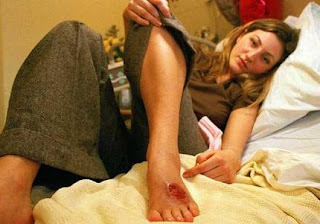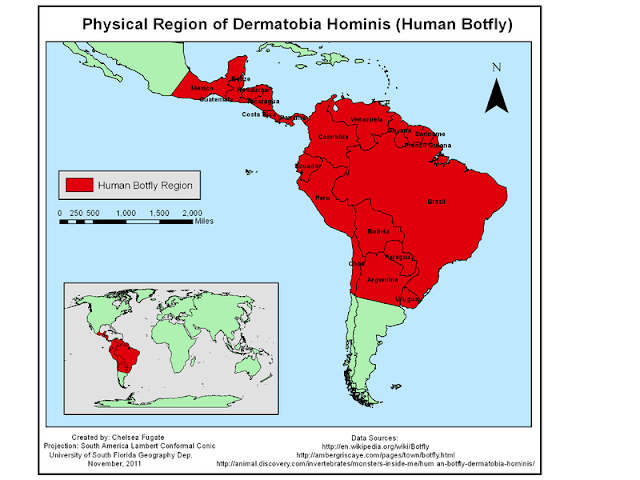Of course we've all heard about parasites before, it's that kind of animals you should avoid, the botfly who spend some part of their lives depending on other creature's body. Well, we mostly heard about the ones that parasitise mamals, like on cows, deer, etc, but have you ever heard a species of fly which parasitise humans when they are at larvae period, the name is dermatobia hominis, (Greek δέρμα, skin + βίος, life, and Latin hominis, of a human), it is one of several species of fly the larvae of which parasitise humans (in addition to a wide range of other animals, including other primates).
It is also known as the torsalo or American warble fly, even though the warble fly is in the genus Hypoderma and not Dermatobia and is a parasite on cattle and deer instead of humans.
 |
| Female Adult Bot Fly |
Dermatobia fly eggs have been shown to be vectored by over 40 species of mosquitoes and muscoid flies, as well as one species of tick; the female captures the mosquito and attaches its eggs to its body, then releases it. Either the eggs hatch while the mosquito is feeding on human genitals, and the larvae use the mosquito bite area as the entry point, or the eggs simply drop off the muscoid fly when it lands on the skin. The larvae develop inside the subcutaneous layers, and after approximately eight weeks, they drop out to pupate for at least a week, typically in the soil. The adults are small gray flies resembling a blowfly.
 |
| bot fly in the feet |
Recently, physicians have discovered that venom extractor syringes can remove larvae with ease at any stage of growth. As these devices are a common component of first-aid kits to deal with snakebites, this is an effective and easily accessible solution.
 |
| bot fly in the head, ouch !! |
Covering the location with adhesive tape would also result partial asphixiation and weakening of the larva, but is not recommended because the larva's breathing tube is fragile and would be broken during the removal of the tape, leaving most of the larva behind.
 |
| Check out where this creature resides, watch out when you are there |
Petroleum jelly or vaseline can also be applied over the location, which prevents air from reaching the larva, suffocating it. It can then be squeezed out.
This creature is definitely one of those animals that you should really avoid, it's the bot fly, remember that ^_^









No comments:
Post a Comment